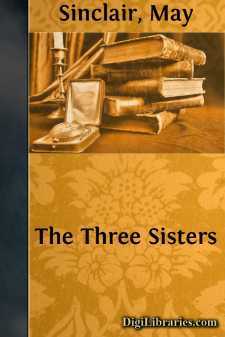Categories
- Antiques & Collectibles 13
- Architecture 36
- Art 48
- Bibles 22
- Biography & Autobiography 813
- Body, Mind & Spirit 142
- Business & Economics 28
- Children's Books 17
- Children's Fiction 14
- Computers 4
- Cooking 94
- Crafts & Hobbies 4
- Drama 346
- Education 46
- Family & Relationships 57
- Fiction 11829
- Games 19
- Gardening 17
- Health & Fitness 34
- History 1377
- House & Home 1
- Humor 147
- Juvenile Fiction 1873
- Juvenile Nonfiction 202
- Language Arts & Disciplines 88
- Law 16
- Literary Collections 686
- Literary Criticism 179
- Mathematics 13
- Medical 41
- Music 40
- Nature 179
- Non-Classifiable 1768
- Performing Arts 7
- Periodicals 1453
- Philosophy 64
- Photography 2
- Poetry 896
- Political Science 203
- Psychology 42
- Reference 154
- Religion 513
- Science 126
- Self-Help 84
- Social Science 81
- Sports & Recreation 34
- Study Aids 3
- Technology & Engineering 59
- Transportation 23
- Travel 463
- True Crime 29
May Sinclair
May Sinclair (1863-1946) was an influential British novelist and critic, renowned for her contributions to modernist literature. She is credited with coining the term "stream of consciousness" to describe a narrative technique that seeks to depict the multitudinous thoughts and feelings which pass through the mind. Sinclair's notable works include "The Life and Death of Harriett Frean" and "Mary Olivier: A Life," which explore themes of women's independence and psychological depth.
Author's Books:
Sort by:
by:
May Sinclair
MR. NEVILL TYSON There were only two or three houses in Drayton Parva where Mr. and Mrs. Nevill Tyson were received. A thrill of guilty expectation used to go through the room when they were announced, and people watched them with a fearful interest, as if they were the actors in some enthralling but forbidden drama. Perhaps, if she had been tried by a jury of her peers—but Mrs. Nevill Tyson had no...
more...
by:
May Sinclair
I Frances Harrison was sitting out in the garden under the tree that her husband called an ash-tree, and that the people down in her part of the country called a tree of Heaven. It was warm under the tree, and Frances might have gone to sleep there and wasted an hour out of the afternoon, if it hadn't been for the children. Dorothy, Michael and Nicholas were going to a party, and Nicky was...
more...
by:
May Sinclair
I North of east, in the bottom, where the road drops from the High Moor, is the village of Garth in Garthdale. It crouches there with a crook of the dale behind and before it, between half-shut doors of the west and south. Under the mystery and terror of its solitude it crouches, like a beaten thing, cowering from its topmost roof to the bowed back of its stone bridge. It is the last village up...
more...
by:
May Sinclair
INTRODUCTION When six months ago Mr. Thomas Seccombe suggested that I should write a short essay on "The Three Brontës" I agreed with some misgiving. Yet that deed was innocent compared with what I have done now; and, in any case, the series afforded the offender a certain shelter and protection. But to come out like this, into the open, with another Brontë book, seems not only a dangerous,...
more...
by:
May Sinclair
I They turned again at the end of the platform. The tail of her long, averted stare was conscious of him, of his big, tweed-suited body and its behaviour, squaring and swelling and tightening in its dignity, of its heavy swing to her shoulder as they turned. She could stave off the worst by not looking at him, by looking at other things, impersonal, innocent things; the bright, yellow, sharp gabled...
more...
by:
May Sinclair
I "Stephen K. Lepper, Pork-Packing Prince, from Chicago, U. S. A., by White Star Line, for Liverpool." Such was the announcement with which the Chicago Central Advertiser made beautiful its list of arrivals and departures. It was not exactly a definition of him. To be sure, if you had caught sight of him anywhere down the sumptuous vista of the first-class sleeping-saloon of the New York and...
more...
by:
May Sinclair
It was four o'clock in the morning. Mrs. Walter Majendie still lay on the extreme edge of the bed, with her face turned to the dim line of sea discernible through the open window of the hotel bedroom. Since midnight, when she had gone to bed, she had lain in that uncomfortable position, motionless, irremediably awake. Mrs. Walter Majendie was thinking. At first the night had gone by her...
more...
by:
May Sinclair
T was Friday, the day he always came, if (so she safeguarded it) he was to come at all. They had left it that way in the beginning, that it should be open to him to come or not to come. They had not even settled that it should be Fridays, but it always was, the week-end being the only time when he could get away; the only time, he had explained to Agatha Verrall, when getting away excited no remark. He...
more...
by:
May Sinclair
CHAPTER I Horace Jewdwine had made the most remarkable of his many remarkable discoveries. At least he thought he had. He could not be quite sure, which was his excuse for referring it to his cousin Lucia, whose instinct (he would not call it judgement) in these matters was infallible—strangely infallible for so young a girl. What, he wondered, would she say to Savage Keith Rickman? On Saturday, when...
more...
by:
May Sinclair
Three times during dinner he had asked himself what, after all, was he there for? And at the end of it, as she rose, her eyes held him for the first time that evening, as if they said that he would see. She had put him as far from her as possible, at the foot of her table between two of the four preposterous celebrities whom she had asked him, George Tanqueray, to meet. Everything, except her eyes, had...
more...











